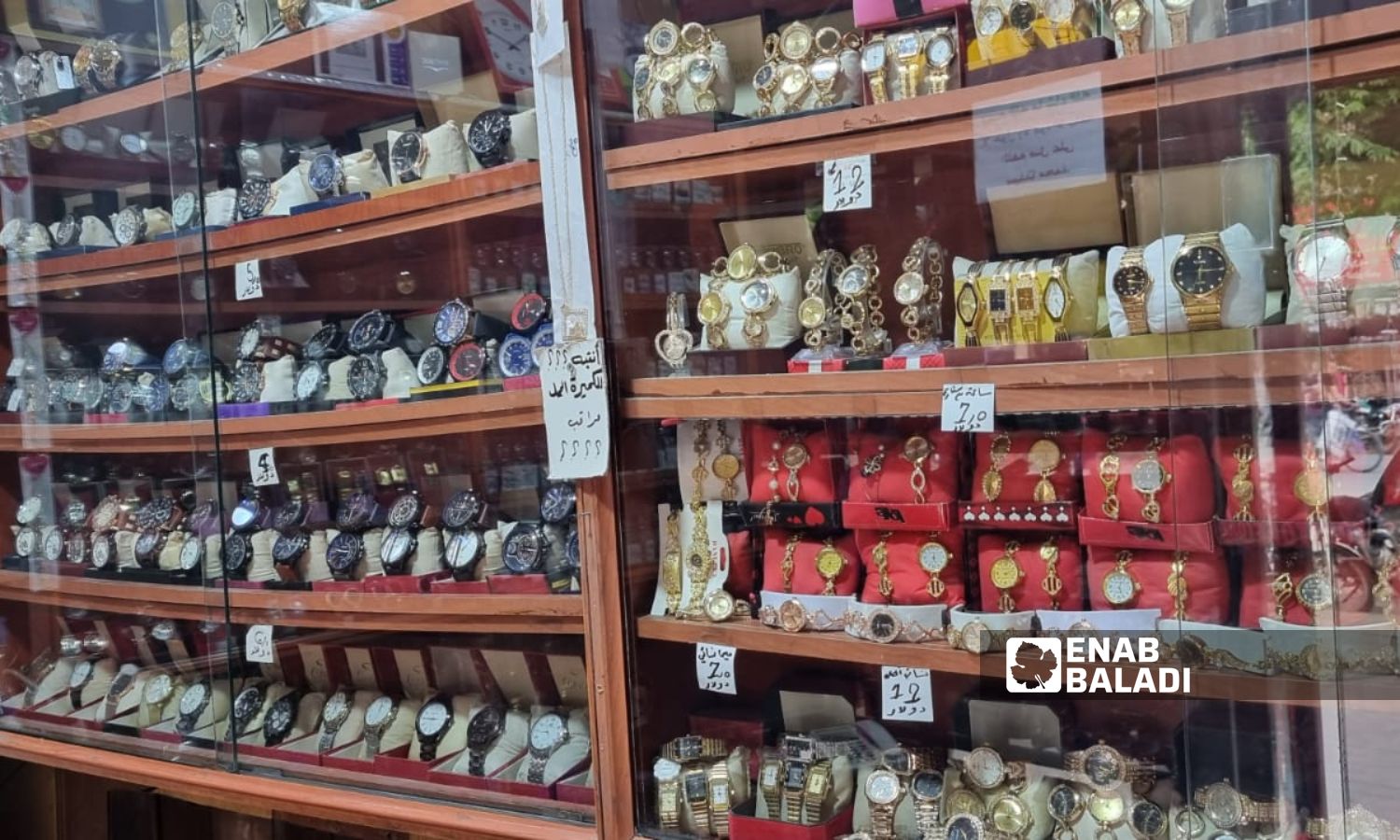



Idlib – Anas al-Khouli
Due to the cessation of demand for buying or maintaining watches, a profession that Zakaria Saflou inherited from his father over 25 years ago, the man is compelled to work selling mobile devices or perfumes in his shop, where he resides in the city of Idlib, northern Syria.
Saflou’s profession, which he inherited from his father, is no longer sufficient to meet his family’s needs, but he clings to it out of love and passion because it still brings in some money, despite requiring a lot of patience, he says.
Saflou told Enab Baladi that the profession of repairing watches used to secure a comfortable life for those involved, but the advancement of technology and the proliferation of mobile devices has led to a near-complete halt in demand for watches, threatening the extinction of the watchmaker profession.
In addition to the watch trade, in search of another source of income, Saflou has also worked in mobile device trading, although it has brought him financial losses in some instances, and not yielded good financial returns in others. He is currently looking for another trade to supplement his watch business.
Progress and the digital transformation, along with the spread of mobile devices that include easily adjustable clocks and alarms, have led many to forego buying traditional watches, threatening to render the watchmaker profession extinct.
Saflou mentioned that today’s youth buy watches as gifts for certain occasions or simply wear them as a “fashion accessory” on their wrists, indifferent to whether the watches are set to the correct time or even if they work, relying instead on their mobile devices.
The prices of popular watches in Idlib range from $2.50 to ten dollars, with demand for watches increasing during holiday periods. Mid-priced watches, which have metal straps, cost more than ten dollars and are used as gifts in wedding ceremonies.
Saflou also noted that there is very little demand for expensive watches from global brands such as “Citizen,” “Jovial,” “Al-Fajr,” and “Al-Harameen,” which are imported from the Gulf Arab states, with each priced up to $150.
In northern Syria, the daily wage for a worker in the best cases is 100 Turkish lira (about three US dollars), while the recognized poverty threshold is 10,843 Turkish lira, and the extreme poverty threshold is 8,933 lira.
The demand for maintaining watches has stopped due to the prevalence of cheap watches among citizens, and the unavailability of spare parts and maintenance for expensive watches, leading to the decline and even “extinction” of maintenance, as some watch shop owners in Idlib told Enab Baladi.
Working in watch maintenance requires a lot of effort, time, and precision.
Mufid al-Khatib (52 years old), a displaced person residing in the city of Idlib, has been working in watch maintenance for 35 years. He now relies on the perfume assembly and accessories trade as his main source of income due to the halt in demand for watch maintenance.
Al-Khatib told Enab Baladi that he stopped importing watch parts ten years ago due to the cessation of maintenance requests and was forced to look for another source of livelihood in addition to repair work.
According to al-Khatib, there are two main reasons for the cessation of demand for watch maintenance. The first is that the majority of citizens no longer care about watches after adopting mobile devices.
The second reason is the acquisition of cheap watches, so people do not repair them if they stop working due to their low original price and lack of interest in the watch.
On the other hand, a few citizens own high-priced brand watches and care about them, but the rarity of these watches prevents parts importation by those working in the profession, forcing the owner to throw the watch in a drawer as a heritage piece they keep at home, as al-Khatib expressed to Enab Baladi.
Al-Khatib mentioned that maintenance requests he receives at his shop in Idlib are rare from those wearing moderately priced wristwatches, and the owner likes its appearance and does not want to change it. However, high-priced watches like “Rolex, Orient, and Fitron” are less likely to come to his shop, and they cannot be maintained due to the unavailability of spare parts. Owners often retract from maintenance upon being informed about the necessity and high costs of importing parts on their expense, eventually relegating these watches to one of the household’s drawers, according to the watchmaker al-Khatib.
Various trades and local products at different levels face difficulties in continuing in Idlib, as well as facing competition from imported goods, which lacks supervision over the quantities entering the area, troubling traders and craftsmen, who in turn complain about financial losses and threats to their livelihoods.
Northwestern Syria is home to 5.1 million people, of whom 4.2 million require assistance, and 3.4 million suffer from food insecurity, 3.4 million of whom are internally displaced, and two million live in camps, according to the United Nations, while local statistics mention 5.5 to 6 million people.
if you think the article contain wrong information or you have additional details Send Correction